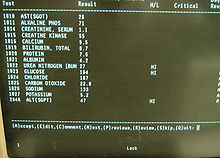- Comprehensive metabolic panel
-
Comprehensive metabolic panel Diagnostics
Computer screen report of a Comprehensive metabolic panel.LOINC 24322-0, 24323-8 The comprehensive metabolic panel, or chemical screen, (CMP; CPT code 80053) is a panel of 14 blood tests which serves as an initial broad screening tool for physicians, nurse practitioners and physician assistants. Because it is often ordered as a routine part of an annual physical examination or check up, over time the CMP provides an important baseline of a patient's basic physiology. Any changes or abnormal results, and in particular combinations of abnormal results, thus provides important initial data for differential diagnosis, in which case more specialized tests may be indicated. In and of itself, however, the CMP provides an important gross check on the status of kidney function, liver function, and electrolyte and fluid balance.
In addition to being used at routine physicals of healthy patients, the CMP is routinely administered to monitor the status of a patient with a chronic disease, such as diabetes mellitus or hypertension.
Previous names for the panel of tests have been Chem 12, Chemistry panel, Chemistry screen, SMA 12, SMA 20 and SMAC (Sequential Multiple Analysis - Computer).[1] The tests are performed on machines based on the AutoAnalyzer invented in 1957.
Contents
Testing
Pathophysiology sample values BMP/ELECTROLYTES: Na+=140 Cl−=100 BUN=20 / Glu=150 K+=4 CO2=22 PCr=1.0 \ ARTERIAL BLOOD GAS: HCO3-=24 paCO2=40 paO2=95 pH=7.40 ALVEOLAR GAS: pACO2=36 pAO2=105 A-a g=10 OTHER: Ca=9.5 Mg2+=2.0 PO4=1 CK=55 BE=−0.36 AG=16 SERUM OSMOLARITY/RENAL: PMO = 300 PCO=295 POG=5 BUN:Cr=20 URINALYSIS: UNa+=80 UCl−=100 UAG=5 FENa=0.95 UK+=25 USG=1.01 UCr=60 UO=800 PROTEIN/GI/LIVER FUNCTION TESTS: LDH=100 TP=7.6 AST=25 TBIL=0.7 ALP=71 Alb=4.0 ALT=40 BC=0.5 AST/ALT=0.6 BU=0.2 AF alb=3.0 SAAG=1.0 SOG=60 CSF: CSF alb=30 CSF glu=60 CSF/S alb=7.5 CSF/S glu=0.4 Typically, the patient fasts for ten or twelve hours before the blood is drawn for the test. The following tests are then performed:[1]
General tests
These tests help screen for a wide variety of problems. The glucose test in particular helps screen for diabetes mellitus and pre-diabetes. The calcium test can indicate or monitor bone diseases or diseases of the parathyroid gland or kidneys. Calcium salts, Lithium, Thiazide diuretics, Thyroxine, and vitamin D can all increase levels and may interfere with this test.[2]
- Serum glucose
- Calcium
Protein tests
Tests of protein levels in the blood help screen for both kidney and liver disorders.
Electrolytes
Electrolyte levels and the balance among them are tightly regulated by the body. Both individual values and ratios among the values are significant; abnormalities among either can indicate problems such as an electrolyte disturbance, acid-base imbalance, or kidney dysfunction.
Kidney function assessment
Liver function assessment
- Alkaline phosphatase (ALP)
- Alanine amino transferase (ALT or SGPT)
- Aspartate amino transferase (AST or SGOT)
- Bilirubin
References
- ^ a b "Comprehensive Metabolic Panel". Lab Tests Online. 2005-10-31. http://www.labtestsonline.org/understanding/analytes/cmp/glance.html. Retrieved 2008-09-22.
- ^ http://www.nlm.nih.gov/medlineplus/ency/article/003477.htm
See also
- Reference ranges for common blood tests
- Basic metabolic panel
- Medical technologist
External links
- http://www.mgh.org/lab/CATALOG/TESTS/135.HTM — Reference range for each test in the CMP
Medical test: Serology, reference range: Clinical biochemistry blood tests (including BMP, CMP) (CPT 82000-84999) Fluid/electrolytes electrolytes (Na+/K+, Cl-/HCO3-) · renal function, BUN-to-creatinine ratio (BUN/Creatinine) · Ca
derived values: Plasma osmolality · Serum osmolal gapAcid-base Nutrition Iron tests: Transferrin saturation = Serum iron / Total iron-binding capacity; Ferritin · Transferrin · Transferrin receptorEndocrine ACTH stimulation test · Thyroid function tests (TSH)
Blood sugar: Glucose test · C-peptide · Fructosamine · Glycated hemoglobinMetabolic Cardiovascular Digestive Liver function tests: protein tests (Human serum albumin, Serum total protein) · ALP · transaminases (ALT, AST, AST/ALT ratio) · Bilirubin (Unconjugated, Conjugated)
Amylase · Lipase (Pancreatic lipase)Categories:- Blood tests
Wikimedia Foundation. 2010.

